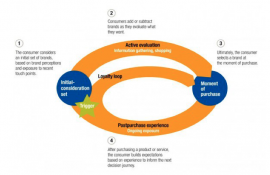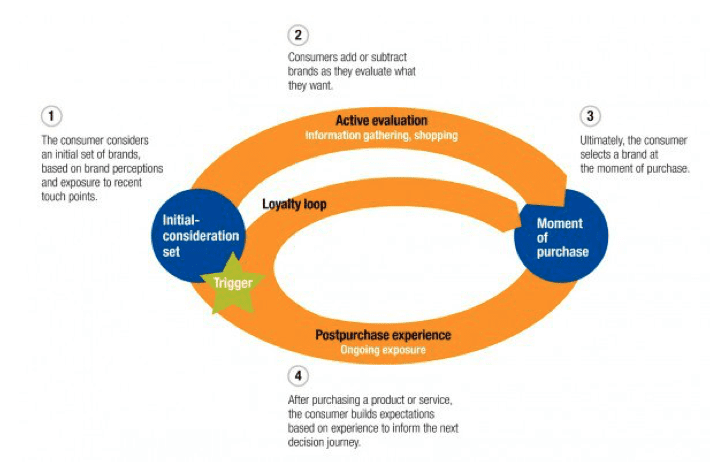McKinsey’s consumer decision journey


McKinsey’s consumer decision journey can help to model how your customer comes to the moment of purchase and discover what makes buy
Based on empirical research, in 2009, McKinsey & Company suggested a dramatic alternative to the traditional purchase funnel. Their research was founded on interviews with 20,000 businesses in the USA, Germany and Japan.
They recommended a loop model instead of the usual straight line approach from awareness, purchase and loyalty. This was a dramatic change although many companies are still, many years later, working on the usual Iinear approach in a non-linear world. This is one of the most widely referenced digital marketing models mentioned by brands and agencies, so we use it to start this section. It has spawned many imitators including Google’s ZMOT.
How can I use this model?
This model is still used by McKinsey & Company and in 2011, one of their team, David Edelman suggested specific actions to achieve the moment of purchase. Reviewing each stage within the loop enables companies to better understand where there may be gaps and lost sales opportunities.
Align – be part of the initial consideration
Ensure the business is aligned to the customers. Fish where there are fish! No point using Facebook if customers don’t use this channel. One of the challenges is that business to business (B2) often feel the need to establish a Facebook channel even if their customers don’t use it.
Link – integrate all aspects of the brand
Many companies understand the nature of branding better and the need for consistency in terms of promotion and identity. The one area where it can go wrong, is in staff messaging.
Don’t you hate it when you have purchased from a company several time and there’s one offer on Facebook, a different promotion elsewhere and they forgot to tell you? This element ensures consistency which is a key theme through all digital marketing as customers will soon share errors or omissions.
Lock – Find ways to retain customers’ interest
Retaining and “locking customers in” to ensure your company is front of mind, or the first to search, may include moving outside social spaces and running competitions or offers to capture data such as email addresses. This takes the conversation from one to many to one to one.
The lock concept has been developed by many companies when they provide loyalty cards. Using the data can show when customers buy, their spend (your share of the wallet) and favourite items which can lead to timely and relevant offers. Starbucks often send their customers who have registered a top-up card (these became more popular when the Apple watch was launched) offers and it seems these occur when there has been no visit in a two-week period.
Loop – Explore ways to build advocacy
To always be front of mind and ensure customers think of you when they require that product or service is a challenge and this is the element that McKinsey refer to as the loop element. McKinsey quote Amazon as the company that has best achieved this. However, this is why companies build apps, it makes the entire purchasing and re-purchasing process easier. Amazon has an app, a one-click purchase path and has removed every obstacle in the way of the buyer.
Ignoring the investment and time required to build an app, the challenge in creating apps is that many customers have many apps. How many apps are on your mobile? The app requires greater functionality, more value or usefulness to ensure it is used by customers.
What to watch for
The model is focused on an end to end purchase in consumer markets and may be less applicable in the business to business arena where there is a much larger or longer purchasing sequence.
A similar model is Google’s ZMOT model which is particularly relevant to retail purchases. It’s explained in this article and we also have an infographic combining the ZMOT and McKinsey models.
From our sponsors: McKinsey’s consumer decision journey



